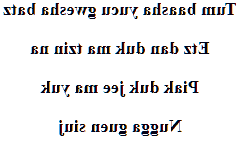Ayapanec love poem
Gwesha batz
Tum baasha yucu gwesha batz
Etz dan duk ma tzin na
Piak duk jee ma yuk
Nugga guen siuj
Maria Esperanza Lopez Montejo y Esteban Lopez Velazquez
Translator and speaker
Thanks to José Manuel Segovia Velazquez


→ French poem ←
Ayapaneco language
My love poem into Ayapaneco (Ayapa Zoque, Numte Oote = true voice, Tabasco Zoque, Ayapanec, Zoque de Ayapanec, Zoque de Tabasco), here in "Ayapa Jalpa de Méndez Tabasco", which is the Mixe-Zoque language of Zoque people in Ayapa (Mexico).
This language is critically endangered, since there are only four speakers left, but the Instituto Nacional de Lenguas Indígenas (INALI) is trying to revitalize it.
Since 2012 the new generations of Zoque in Ayapa have become aware of their origin, and of the importance of being able to keep their native language.
This language takes its name from the city of Ayapa (see map), and the region from where it came (Tabasco).
The Mixe-Zoquean languages date from around -1500 years before our era. After having been in contact with the Olmec civilization, migrations would have taken place towards the Mayan regions of the northeast of Tabasco.
Then there would have been migrations to this same area of Nahuatl speakers, which would have given this Mixe-Zoque, Nahuatl and Maya coexistence until the arrival of the Spaniards. The first trace of the language after the Spaniards time dates from 1552.
Ayapa
Ayapa is a village with just over 5,000 inhabitants, which depends of the municipality of Jalpa de Méndez, located in the state of Tabasco in Mexico.
It was not far from there, in this same state, at the mouth of the Grijalva river that Cortès landed in 1519, on a territory discovered less than a year earlier.